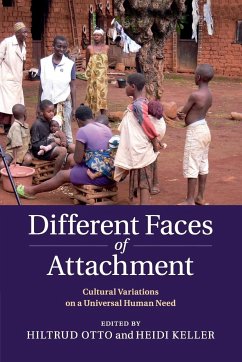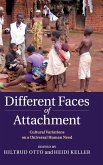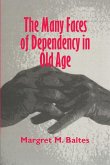Different Faces of Attachment
Herausgeber: Otto, Hiltrud; Keller, Heidi
Different Faces of Attachment
Herausgeber: Otto, Hiltrud; Keller, Heidi
- Broschiertes Buch
- Merkliste
- Auf die Merkliste
- Bewerten Bewerten
- Teilen
- Produkt teilen
- Produkterinnerung
- Produkterinnerung
This groundbreaking reconceptualization of attachment theory brings together leading scholars from psychology, anthropology and related fields.
Andere Kunden interessierten sich auch für
![Different Faces of Attachment Different Faces of Attachment]() Different Faces of Attachment115,99 €
Different Faces of Attachment115,99 €![The Many Faces of Dependency in Old Age The Many Faces of Dependency in Old Age]() Margaret M. BaltesThe Many Faces of Dependency in Old Age36,99 €
Margaret M. BaltesThe Many Faces of Dependency in Old Age36,99 €![Faces of Women and Aging Faces of Women and Aging]() Ellen ColeFaces of Women and Aging68,99 €
Ellen ColeFaces of Women and Aging68,99 €![Faces in a Cloud Faces in a Cloud]() Faces in a Cloud109,99 €
Faces in a Cloud109,99 €![Faces of Anger Faces of Anger]() Carol BulkeleyFaces of Anger15,99 €
Carol BulkeleyFaces of Anger15,99 €![Masks or Faces a Study in the Pdychology of Acting Masks or Faces a Study in the Pdychology of Acting]() William ArcherMasks or Faces a Study in the Pdychology of Acting33,99 €
William ArcherMasks or Faces a Study in the Pdychology of Acting33,99 €![The Many Faces of Anxiety The Many Faces of Anxiety]() Susan Rau StockerThe Many Faces of Anxiety14,99 €
Susan Rau StockerThe Many Faces of Anxiety14,99 €-
-
-
This groundbreaking reconceptualization of attachment theory brings together leading scholars from psychology, anthropology and related fields.
Hinweis: Dieser Artikel kann nur an eine deutsche Lieferadresse ausgeliefert werden.
Hinweis: Dieser Artikel kann nur an eine deutsche Lieferadresse ausgeliefert werden.
Produktdetails
- Produktdetails
- Verlag: Cambridge University Press
- Seitenzahl: 338
- Erscheinungstermin: 20. November 2017
- Englisch
- Abmessung: 229mm x 152mm x 19mm
- Gewicht: 491g
- ISBN-13: 9781316617984
- ISBN-10: 131661798X
- Artikelnr.: 50447412
- Herstellerkennzeichnung
- Libri GmbH
- Europaallee 1
- 36244 Bad Hersfeld
- gpsr@libri.de
- Verlag: Cambridge University Press
- Seitenzahl: 338
- Erscheinungstermin: 20. November 2017
- Englisch
- Abmessung: 229mm x 152mm x 19mm
- Gewicht: 491g
- ISBN-13: 9781316617984
- ISBN-10: 131661798X
- Artikelnr.: 50447412
- Herstellerkennzeichnung
- Libri GmbH
- Europaallee 1
- 36244 Bad Hersfeld
- gpsr@libri.de
Foreword Michael Lamb; Introduction: understanding relationships. What we
would need to know to conceptualize attachment as the cultural solution of
a universal developmental task Heidi Keller; Part I. Attachment as an
Adaptation: Evolutionary, Cultural, and Historical Perspectives: 1. Family
relations among cooperative breeders: challenges and offerings to
attachment theory from evolutionary anthropology Johannes Johow and Eckart
Voland; 2. Attachment theory as cultural ideology Robert A. LeVine; 3.
'Babies aren't persons': a survey of delayed personhood David Lancy; Part
II. Multiple Attachments: Allomothering, Stranger Anxiety, and Intimacy: 4.
Maternal and allomaternal responsiveness: the significance of cooperative
caregiving in attachment theory Courtney L. Meehan and Sean Hawks; 5.
Bonding and belonging beyond WEIRD worlds: rethinking attachment theory on
the basis of cross-cultural anthropological data Birgitt Röttger-Rössler;
6. Concentric circles of attachment in Pirahã: a brief survey Daniel L.
Everett; 7. Is it time to detach from attachment theory? Perspectives from
the West African rain forest Alma Gottlieb; 8. 'Don't show your emotions!'
Emotion regulation and attachment in the Cameroonian Nso Hiltrud Otto; 9.
Family life as bricolage - reflections on intimacy and attachment in death
Nancy Scheper-Hughes; Part III. Looking into the Future and Implications
for Policy Development: 10. The socialization of trust: plural caretaking
and diverse pathways in human development across cultures Thomas S.
Weisner; 11. The precursors of attachment security: behavioral systems and
culture Vivian Carlson and Robin Harwood; Part IV. Conclusion Heidi Keller
and Hiltrud Otto.
would need to know to conceptualize attachment as the cultural solution of
a universal developmental task Heidi Keller; Part I. Attachment as an
Adaptation: Evolutionary, Cultural, and Historical Perspectives: 1. Family
relations among cooperative breeders: challenges and offerings to
attachment theory from evolutionary anthropology Johannes Johow and Eckart
Voland; 2. Attachment theory as cultural ideology Robert A. LeVine; 3.
'Babies aren't persons': a survey of delayed personhood David Lancy; Part
II. Multiple Attachments: Allomothering, Stranger Anxiety, and Intimacy: 4.
Maternal and allomaternal responsiveness: the significance of cooperative
caregiving in attachment theory Courtney L. Meehan and Sean Hawks; 5.
Bonding and belonging beyond WEIRD worlds: rethinking attachment theory on
the basis of cross-cultural anthropological data Birgitt Röttger-Rössler;
6. Concentric circles of attachment in Pirahã: a brief survey Daniel L.
Everett; 7. Is it time to detach from attachment theory? Perspectives from
the West African rain forest Alma Gottlieb; 8. 'Don't show your emotions!'
Emotion regulation and attachment in the Cameroonian Nso Hiltrud Otto; 9.
Family life as bricolage - reflections on intimacy and attachment in death
Nancy Scheper-Hughes; Part III. Looking into the Future and Implications
for Policy Development: 10. The socialization of trust: plural caretaking
and diverse pathways in human development across cultures Thomas S.
Weisner; 11. The precursors of attachment security: behavioral systems and
culture Vivian Carlson and Robin Harwood; Part IV. Conclusion Heidi Keller
and Hiltrud Otto.
Foreword Michael Lamb; Introduction: understanding relationships. What we
would need to know to conceptualize attachment as the cultural solution of
a universal developmental task Heidi Keller; Part I. Attachment as an
Adaptation: Evolutionary, Cultural, and Historical Perspectives: 1. Family
relations among cooperative breeders: challenges and offerings to
attachment theory from evolutionary anthropology Johannes Johow and Eckart
Voland; 2. Attachment theory as cultural ideology Robert A. LeVine; 3.
'Babies aren't persons': a survey of delayed personhood David Lancy; Part
II. Multiple Attachments: Allomothering, Stranger Anxiety, and Intimacy: 4.
Maternal and allomaternal responsiveness: the significance of cooperative
caregiving in attachment theory Courtney L. Meehan and Sean Hawks; 5.
Bonding and belonging beyond WEIRD worlds: rethinking attachment theory on
the basis of cross-cultural anthropological data Birgitt Röttger-Rössler;
6. Concentric circles of attachment in Pirahã: a brief survey Daniel L.
Everett; 7. Is it time to detach from attachment theory? Perspectives from
the West African rain forest Alma Gottlieb; 8. 'Don't show your emotions!'
Emotion regulation and attachment in the Cameroonian Nso Hiltrud Otto; 9.
Family life as bricolage - reflections on intimacy and attachment in death
Nancy Scheper-Hughes; Part III. Looking into the Future and Implications
for Policy Development: 10. The socialization of trust: plural caretaking
and diverse pathways in human development across cultures Thomas S.
Weisner; 11. The precursors of attachment security: behavioral systems and
culture Vivian Carlson and Robin Harwood; Part IV. Conclusion Heidi Keller
and Hiltrud Otto.
would need to know to conceptualize attachment as the cultural solution of
a universal developmental task Heidi Keller; Part I. Attachment as an
Adaptation: Evolutionary, Cultural, and Historical Perspectives: 1. Family
relations among cooperative breeders: challenges and offerings to
attachment theory from evolutionary anthropology Johannes Johow and Eckart
Voland; 2. Attachment theory as cultural ideology Robert A. LeVine; 3.
'Babies aren't persons': a survey of delayed personhood David Lancy; Part
II. Multiple Attachments: Allomothering, Stranger Anxiety, and Intimacy: 4.
Maternal and allomaternal responsiveness: the significance of cooperative
caregiving in attachment theory Courtney L. Meehan and Sean Hawks; 5.
Bonding and belonging beyond WEIRD worlds: rethinking attachment theory on
the basis of cross-cultural anthropological data Birgitt Röttger-Rössler;
6. Concentric circles of attachment in Pirahã: a brief survey Daniel L.
Everett; 7. Is it time to detach from attachment theory? Perspectives from
the West African rain forest Alma Gottlieb; 8. 'Don't show your emotions!'
Emotion regulation and attachment in the Cameroonian Nso Hiltrud Otto; 9.
Family life as bricolage - reflections on intimacy and attachment in death
Nancy Scheper-Hughes; Part III. Looking into the Future and Implications
for Policy Development: 10. The socialization of trust: plural caretaking
and diverse pathways in human development across cultures Thomas S.
Weisner; 11. The precursors of attachment security: behavioral systems and
culture Vivian Carlson and Robin Harwood; Part IV. Conclusion Heidi Keller
and Hiltrud Otto.








